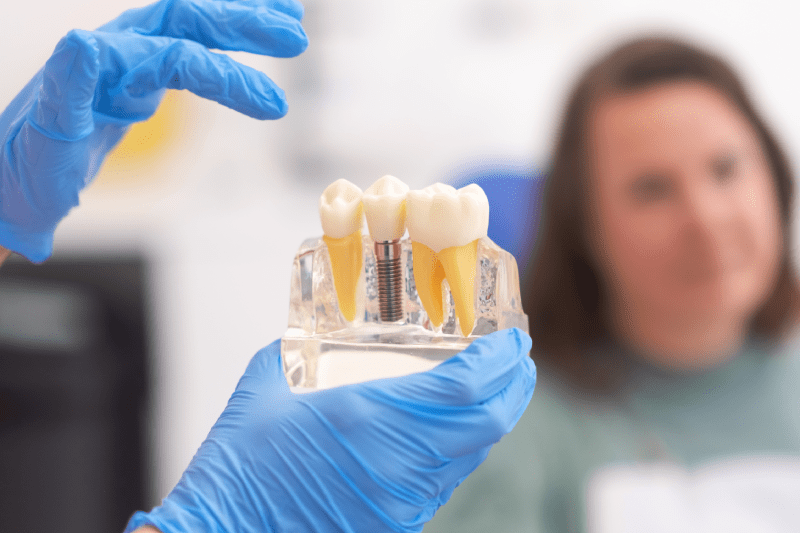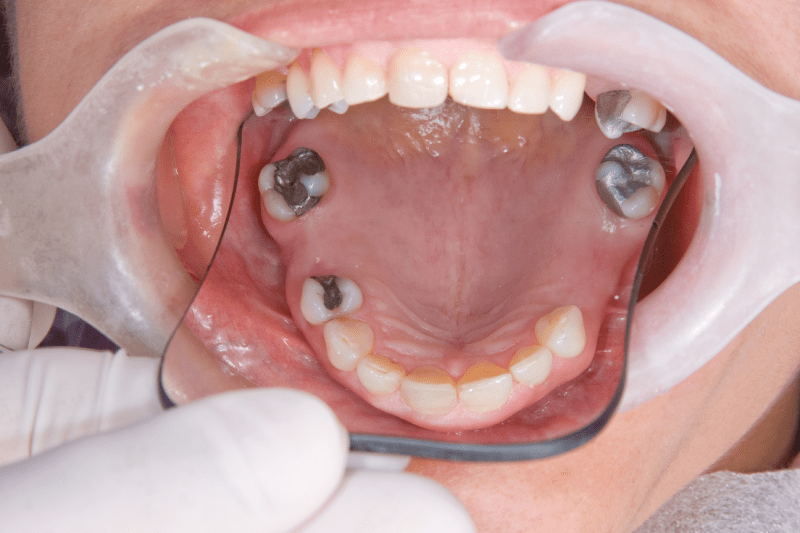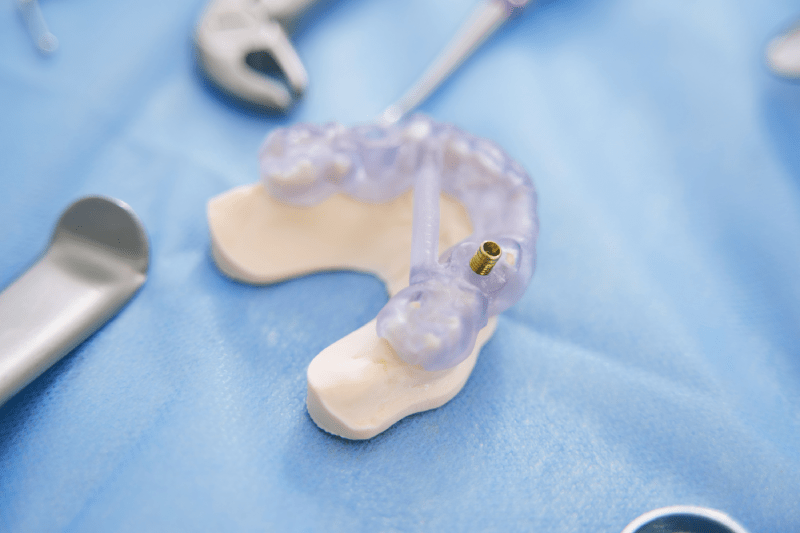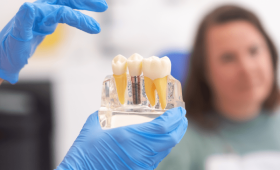What Are the Main Factors Affecting Dental Implant Prices in Pécs?
Dental implant prices in Pécs vary depending on many variables. One of the most important factors is the quality and origin of the implant brand used; premium Swiss or German brands like Straumann or Nobel Biocare are more expensive than more affordable Hungarian or other European-origin brands.
In addition, the complexity of the treatment has a great impact on the price. The need for additional surgical procedures (bone grafting, sinus lift) in cases such as full-mouth restoration instead of a single implant or bone deficiency significantly increases the total cost. The location of the clinic, the level of expertise, and the experience of the dentist are also decisive in pricing.
What is the Average Cost of a Single Dental Implant in Pécs?
The average cost of a single dental implant in Pécs varies according to the brand used and the clinic’s pricing policy, but it generally has a price range of 600 Euro to 1,200 Euro. This price may only include the surgical placement of the implant, and an additional fee may be charged for the abutment and crown (tooth veneer) that will go on it. While some clinics offer package prices that cover all stages, others charge for each stage separately. It is very important to get a written price quote that includes all expenses before starting the treatment.
How Do Dental Implant Prices in Pécs Compare to Other Cities in Hungary?
Pécs can offer more affordable prices compared to other major cities in Hungary, especially the capital Budapest. Clinic prices in Budapest are generally higher because it attracts more health tourists and has a higher cost of living. Thanks to being both a university city and offering a quieter life, Pécs can provide quality services at more competitive prices. This makes Pécs an attractive option for budget-conscious patients.
What Should Be Considered About the Quality of Dentists and Clinics in Hungary?
Hungary has some of the best dentists in Europe, thanks to its universities that provide high-standard dental education. Dentists in Hungary successfully apply modern technologies and up-to-date treatment methods thanks to the high-quality education they receive and continuous professional development programs. Many clinics have international quality certificates and use the latest technologies. However, it is still important to research factors such as the dentist’s experience, patient reviews of the clinic, and hygiene standards.
How Does Dental Implant Treatment in Hungary Compare to Turkey?
Hungary and Turkey are popular health tourism destinations for dental implant treatment. In terms of price, Hungary is generally a little more expensive than Turkey, but it is still much more economical than Western European countries. Both countries offer high-quality and modern services. Turkey’s biggest advantage is that the exchange rates are more favorable for foreign patients and the range of services is wider. Hungary’s advantage is its more central location and being within the European Union.
What Are the Main Materials Used in Dental Implant Treatment?
The most common material used in dental implant treatment is titanium, a biocompatible metal that is easily accepted by the human body. Titanium permanently integrates with the jawbone, making the implant long-lasting and stable. Titanium implants have been used successfully in dentistry for many years. In addition to titanium, zirconium implants, which offer an appearance closer to the natural tooth color, are also preferred for patients with aesthetic concerns or metal allergies. Zirconium implants are generally more expensive.

How Long Does the Total Duration of Dental Implant Treatment Take?
Dental implant treatment is generally a two-stage process and can take several months in total. In the first stage, the implant is surgically placed in the jawbone, and a healing period of 3 to 6 months is expected for the implant to fuse with the bone. This process is called osseointegration and may vary depending on the patient’s general health and bone quality. In the second stage, the treatment is completed by placing the abutment and prosthetic crown on the implant. In some special cases, this process can be completed in a single day, but this is not valid for every patient.
Is Dental Implant Treatment a Painful Procedure?
Dental implant treatment is a painless procedure as it is performed under local anesthesia. The patient does not feel any pain or discomfort during the procedure. A slight pain or swelling may occur for a few days after the operation, but this can usually be controlled with simple painkillers and passes quickly. Most patients find the implant operation even less painful than a tooth extraction. Your dentist will provide you with all the necessary information to make your post-treatment process comfortable.
Who Can Get Dental Implant Treatment?
Dental implant treatment can be applied to individuals whose jawbone development is complete (usually over 18 years of age), who are in good general health, and who pay attention to oral hygiene. One of the most important conditions for the success of the implant is to have sufficient bone volume and density. Implant treatment may not be suitable for patients with serious health problems such as uncontrolled diabetes, advanced bone loss, or immune system diseases. The dentist determines the patient’s suitability for the implant with a detailed examination and X-ray.
How Do Additional Procedures Like Bone Grafting or Sinus Lifting Affect the Cost?
Additional procedures such as bone grafting or sinus lifting may become mandatory for patients who do not have sufficient bone volume for implant placement. These additional surgical procedures increase the complexity and duration of the treatment, which significantly increases the total cost. The cost of bone grafting varies depending on the material used and the size of the procedure. Such additional procedures must be taken into account when planning the total treatment budget.
What Is the Lifespan of Dental Implants?
Dental implants can be used for a lifetime when applied correctly and with proper oral hygiene. Scientific studies show that the ten-year success rates of dental implants are over 95%. Regular brushing, flossing, and going to the dentist for a check-up every six months are of great importance to extend the life of the implant. Staying away from habits such as smoking and alcohol also helps protect implant health. The choice of a quality implant and an experienced dentist also extends this lifespan.
What Is the Cost of a Full-Mouth Implant Treatment?
Full-mouth implant treatment is usually offered with concepts such as “All-on-4” or “All-on-6”. In these treatments, four or six implants are used to place a fixed prosthesis on the jawbone of a patient who is missing all their teeth. The cost of a full-mouth implant treatment in Hungary can range from 4,000 Euro to 10,000 Euro, depending on the number of implants, the brand, and the type of prosthesis. This cost may vary depending on the patient’s specific condition and treatment plan.
Why Are Hungary’s Prices Considered Affordable?
There are several reasons why dental implant prices in Hungary are affordable. The biggest advantage is that the Euro is highly valued against the Hungarian currency, the forint (HUF). This makes the same quality of service much more affordable for foreign patients. Lower living and operational costs also mean lower expenses for clinics, which is reflected in the prices. The government’s support for health tourism and the competition among clinics also keep prices at reasonable levels.
Do Low Prices in Hungary Mean Low Quality?
Low prices in Hungary certainly do not mean low-quality service. The country has a long-standing tradition of dental education and is home to many dentists specialized in this field. Many Hungarian clinics have international accreditations and use globally recognized implant brands. The important thing is to make a correct and reliable choice by examining patient reviews and checking the clinic’s references.
How Are Post-Treatment Emergencies Managed?
For rare emergencies that may occur after dental implant treatment (severe pain, bleeding, or swelling), clinics usually offer emergency services or 24-hour phone lines. It is important to ask your clinic how they handle emergencies and which communication channels you should use before treatment. In this way, you can get quick support in an unexpected situation.
Do Dentists in Hungary Speak English?
Since Hungary is a member of the European Union and a major tourist destination, many dental clinics serve international patients. Therefore, the dentists and staff working in the clinic generally speak English well. This provides ease of communication for English-speaking patients and makes the treatment process more comfortable. Most clinic websites also offer English language support.
Are There Special Packages for Patients from Abroad?
Many dental clinics in Hungary offer special treatment packages for patients from abroad. These packages can often include additional services such as airport transfers, accommodation arrangements, and sometimes city tours, in addition to the implant cost. Such packages help patients make their entire travel and treatment process more planned and smooth. The content and pricing of these packages may vary from clinic to clinic.
Is a Visa Required for Dental Implant Treatment in Hungary?
Hungary is located in the Schengen Area. Therefore, citizens of the Republic of Turkey are required to obtain a Schengen visa to travel to Hungary. When applying for a visa, it is important to state that the purpose of your trip is medical treatment. You need to prepare the necessary documents for the visa application (clinic appointment letter, accommodation information, proof of financial sufficiency). It is of great importance to check the current visa conditions before making travel plans.
What Are the Post-Treatment Care Tips?
For the first few days after the implant is placed, it is important to avoid very hot, hard, or spicy foods. Your dentist will usually recommend a soft diet. You should brush your teeth regularly and clean the area around the implant using dental floss and an interdental brush. Habits such as smoking and alcohol can negatively affect the healing process. In addition, you should avoid putting pressure on the area where the implant is placed during the healing process.
How Often Do Dental Implants Require Maintenance?
Dental implants, like natural teeth, require regular maintenance. You should brush your teeth at least twice a day and clean the area around the implant using dental floss and an interdental brush. In addition, going to your dentist for a regular check-up at least every six months will ensure that your implant lasts a long time. In these check-ups, the condition of the implant and the surrounding tissues is evaluated, and possible problems can be detected at an early stage.
What Are the Reviews of Patients Who Have Had Dental Implant Treatment in Hungary?
The reviews of foreign patients who have had dental implant treatment in Hungary are generally positive. Patients are satisfied with the professionalism of the dentists, the cleanliness of the clinics, and the use of modern technologies. The affordable prices and high quality of service are the most frequently highlighted points. Patients from Western Europe, in particular, are much more satisfied with the service they receive compared to the high prices in their own countries.
What Is the Difference Between a Dental Implant and a Dental Bridge?
A dental implant is an artificial tooth root placed in the jawbone to replace a missing tooth. It provides a natural feel and function because it is integrated into the jawbone and does not harm adjacent teeth. A dental bridge, on the other hand, is a prosthesis placed on the adjacent teeth after they have been reduced to replace a missing tooth. Bridges can damage sound adjacent teeth because they require them to be ground down and cannot prevent bone loss in the jawbone. Implants are a more long-lasting and protective option.
What Is the All-on-4/All-on-6 Concept in Full-Mouth Treatment?
All-on-4 and All-on-6 are fixed prosthesis concepts applied to patients who are missing all of their teeth or whose teeth need to be extracted. In All-on-4, a fixed prosthesis is placed on four implants, while in All-on-6, six implants are used. These concepts aim to provide a full dental restoration with fewer implants and require additional expertise because the implant placement is done at a special angle. In this way, the need for additional procedures such as bone grafting can also be reduced.
What Is the Role of Health Tourism Agencies in Hungary?
Many health tourism agencies in Hungary provide services to facilitate the treatment process for patients from abroad. These agencies help patients with issues such as airport transfers, accommodation arrangements, clinic appointments, and even translation services. In this way, patients can manage the entire process from a single point and complete their treatments comfortably. These agencies usually work in partnership with clinics.
What Are the Best Seasons for Dental Implant Treatment?
There is no seasonal restriction for dental implant treatment. The treatment can be done safely in any season. However, for those who want to combine the treatment process with a holiday or a trip, it may be more comfortable to prefer the spring or autumn months, considering the mild climate of Hungary. These months are also ideal for exploring the cities and participating in cultural events.

What Happens If a Dental Implant Fails?
Dental implant failure is a rare condition and usually occurs due to reasons such as the bone not accepting the implant or an infection. If the implant fails, it is removed by the dentist, and a new implant can be placed after the healing process is complete. Reliable clinics offer a warranty or revision treatment for such situations. It is important to learn the conditions of these guarantees in advance.
How Right Is It to Decide Based on Price Alone?
Since dental implant treatment is a serious surgical procedure, it is not right to decide based on price alone. Choosing the clinic that offers the lowest price can bring risks such as low-quality materials, inexperienced dentists, or poor hygiene standards. The most logical approach is to evaluate the price along with the clinic’s reputation, the dentist’s expertise, the implant brand used, and the quality of service provided. Remember, your oral health is the most important investment in the long run.
What Is the Success Rate of Dental Implant Treatment?
The success rate of dental implant treatment is quite high. When experienced dentists and quality implant brands are used, the success rate can exceed 95%. Factors affecting success include the patient’s general health, oral hygiene, smoking and alcohol habits, and the bone density of the area where the implant is placed. Smoking and inadequate oral hygiene can significantly increase the risk of failure.
Is It Safe to Get Dental Implants?
Dental implant treatment is an extremely safe procedure when applied correctly. Implants are made of biocompatible materials that are easily accepted by the body. Working in sterile conditions and with modern equipment is of critical importance to minimize the risk of infection. Following hygiene rules before and after the procedure increases safety and ensures the success of the treatment.
How Can I Reach Specialized Clinics for Dental Implants in Pécs?
You can reach specialized clinics for dental implants in Pécs by researching online, reading patient reviews, and examining the clinic’s websites. In addition, you can get information about reliable clinics through health tourism agencies. The Faculty of Dentistry of the University of Pécs also plays a major role in the high quality of dentistry in the city.
How Far in Advance Should an Appointment Be Made for Treatment?
For dental implant treatment in Pécs, it is usually necessary to make an appointment several weeks or months in advance, especially during busy periods. For patients from abroad, contacting the clinic in advance for an appointment and travel planning ensures a smooth process. In this way, you have enough time for both treatment planning and travel arrangements and can avoid waiting times.
What Are the Pre- and Post-Treatment Care Tips?
Before treatment, it is important to pay maximum attention to your oral hygiene as recommended by your dentist. This reduces the risk of infection. After treatment, you should eat soft foods for the first few days and continue brushing your teeth and using dental floss. Using antibiotics or painkillers prescribed by your dentist regularly will speed up the healing process.
What Technologies Are Used in Dental Implant Treatment?
In modern dental clinics, advanced technologies that make dental implant treatment safer and faster are used. These technologies include digital tomography (CBCT) used for implant planning, surgical guides created with 3D printers, laser technology, and computer-aided design and manufacturing (CAD/CAM) systems. These technologies increase the success rate by making both the diagnosis and the treatment process more precise.
What Are Patient Rights in Hungary?
Patient rights in Hungary are strictly protected by the health care regulations of the European Union. Patients have the right to be fully informed about the treatment process, get a second opinion, and refuse the treatment plan. Before starting the treatment, it is important to sign a contract or agreement stating all the conditions in writing to protect your rights.
How Does the Treatment Plan and Billing Process Work?
Before starting the treatment, a comprehensive treatment plan is created with a detailed consultation with your dentist. This plan clearly states all the procedures to be done, the materials to be used, and the total cost. The billing process usually proceeds in stages; a separate payment plan can be created for each stage, such as implant placement, healing, and prosthesis placement. A reliable clinic presents all costs transparently and informs the patient about additional fees in advance.


